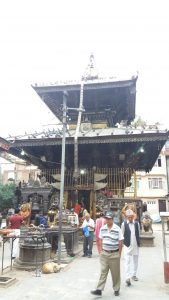Inscription carved on a slab of stone standing near the courtyard of the Tuṅga Hiṭi water-conduit next to the Mīnanātha/ Mañjughoṣa temple, Pātan. Saṃvat 148.
(The first part of the inscription is totally worn away.)
Unprecedented … even after this knowing this is ours, otherwise … ascertaining … favour previously granted … renewed the grant to administer … village of Yupa, a canal … has been built by … Kurpāsad … fort or market where food was available, after this the place from where earth was taken out from the forest situated in the front … of anybody escaped committing this crime he should be sent to the fort … submitting the report to the fort authorities, settle the case as it used to be done before. Near the canal … the entry of those who walked through, night or day should not be objected to … its opposer … whatever has been gained should be presented to the Royal Palace. Anything connected with the canal will be considered by the Royal Court (antarāsanena) and decided. The canal water will be divided into 7 parts, one part to be used by Gīgvala Pāñcālikā, one part by Jājje Pāñcālikā, one part by Tegvala Pāñcālikā, three parts by Yugvala Pāñcālikās, and the remaining part by … lla Pāñcālikā. Knowing this you must realise that this order cannot be transgressed. Those who will break our order or cause it to be broken, we shall not tolerate them. Future kings who are to maintain objects of piety established by their predecessors must give thought to this with devoted mind. It is also said that those kings who follow the edicts of past kings who have been responsible for establishing an order of religious sanctity (dharmyāmsthitim) set up for the interest of the people, will enjoy wealth and prosperity for a long time, just as he gets the goddess of riches as permanent like his wife and will have heavenly abode after death like Indra, chief of Vasus. The dūtaka here is yuvarāja Śrī Vijayadeva, and the date S 148 Pauṣa śukla divā tṛtīyā.
